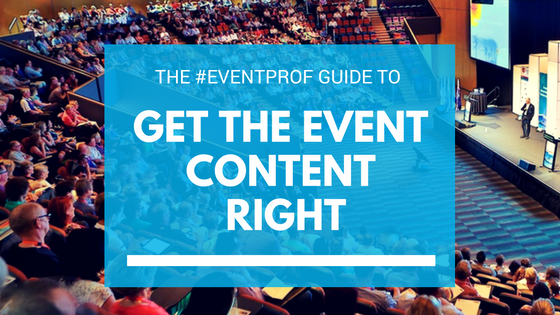Content is King, as the saying goes. Event planners know that it is their task or even the most important part of their job to provide event attendees with relevant content. But most of us have been to at least one event where speakers and their presentations were underwhelming and the content simply not engaging. No event manager does this on purpose. So why does it happen, and how can event planners get the content right?
It is precisely the assumption that content is king which leads event professionals to subject everything else to its rule. From creation to testing and optimization over tracking and marketing of content, the belief is that if only you get the content out there, your event will be a success. But when you start thinking of content as something you simply need to dish out and your event attendees will be happy if they get enough of it, a disconnect is taking place. The inspiration is missing, attendees will strongly feel the absence of personal relevance and speakers will fail to connect with the audience and engage participants. As an event planner, you can learn to prevent this from happening and truly move your audience.
Getting The Content Right vs Getting The Right Content
Great content seems to have so many requirements: it needs to be new, frequent, insightful, relevant, meaningful, valuable, compelling, simple – the list goes on indefinitely. Allocating time and resources towards content is a healthy and necessary practice of business in any industry, not just for events. But don’t fall prey to the misconception that if you build it, they will come. Successful content does not work that way. At the same time, it’s also not a choice between getting the content right or getting the right content; you will need to work on both.
The content you deliver needs to fit all the above-mentioned requirements, and it is just as important that you present it in the right way, on the right platform. Luckily for event organizers, we have more technology than ever before to reach out to our audience in many ways. But at the same time, we fight the for the attention of attendees who often enough are relegated to the mere role of consumer. They have become blind to content as just another thing vying for their attention, especially when it’s meaningless and churned out en masse. Crafting great content and then presenting it just right is an art form.
Put Your Content Into Context
The context of your event content is your event itself, right? Not quite. You have carefully chosen a topic for your event, you have lined up your speakers, you have drafted an agenda, you have reviewed presentations and ensured they will make an impact. But avoid the pitfall of putting the experts on stage and the audience in the room and letting things play out. Without a context for what is being said and presented, a divide or disconnection will inevitably occur. Avoid content just for the sake of having it, don’t tell your audience: here is an expert, you might learn something. Before you tell attendees how something will change the world, their question is “How is my word affected?” You will need to put things in context for them, but don’t let the bigger picture crowd out individual attendees.
Avoid thinking of content as a building block or units you can stack up to construct success. Consider Martin Luther King Jr. and his famous speech, “I have a dream.” He crafted it carefully, then delivered it while improvising half of it – because he sought to move and engage his audience. His plan was never to create a ‘piece of content.’ Event attendees need to be able to relate to content. So conceive and plan your event content with your audience in mind at every touchpoint. Imagine how people will feel, how they will react, and how you can maximize these effects by the way the content – or the story – is delivered.
Make It Personal
When event planners adopt best practises of storytellers, they start getting things right. Brands have learned to talk to consumers on a personal level, interact with them on social media and connect with them through emotional storytelling. In the event industry, a similar development is taking place as we increasingly think of attendees as participants and create experiences for them. Just like consumers have become deaf and blind to advertising that does not appeal to them personally, they are numb to event content that is just noise or serves to fill a gap.
What personal experience do you want to create for your attendees? Can you captivate them, bring inspiration, joy, and emotional connection? How can you move your audience? Think of the message you want to convey, then turn it into something with which attendees can identify. They want to feel included, understood and cared for. Only when your event content appeals to the audience on a personal level will you go beyond filling your need as an event planner and offer something that fills a need of your audience.
Feature Members Of The Community
A great way to present personal connection at your event is to highlight some of your attendees. This can be through user-submitted content such as photos or tweets, featuring of community members or inviting attendees to take the stage or present at panels or workshops. The format has to fit the theme of your event and adapt to your audience. Encourage them to tag on Instagram, display real-time participation on stage or on a social wall, pulling streams filtered by hashtags or handles and presenting them at prominent locations throughout your event. The members and method you choose need to highlight that your audience consists of individuals attendees can identify with.
Engage Your Audience
 By engaging attendees, event managers can match the content to the audience. You can leverage mobile technology to enhance the event experience and provide relevant information directly on devices, for example. Live polling, surveys and questionnaires not only engage attendees and provide you with data, the also send the strong signal to the audience that their view matters and is valued. Steer the attention of your attendees towards interaction with event gamification. Participants can experience quality engagement, learn about content from each other and put the event experience in context. Allowing time and facilitating networking will encourage participants to connect with other people in their interest group. A personal exchange is a great opportunity to discuss and process event content and in turn make it more memorable and engaging.
By engaging attendees, event managers can match the content to the audience. You can leverage mobile technology to enhance the event experience and provide relevant information directly on devices, for example. Live polling, surveys and questionnaires not only engage attendees and provide you with data, the also send the strong signal to the audience that their view matters and is valued. Steer the attention of your attendees towards interaction with event gamification. Participants can experience quality engagement, learn about content from each other and put the event experience in context. Allowing time and facilitating networking will encourage participants to connect with other people in their interest group. A personal exchange is a great opportunity to discuss and process event content and in turn make it more memorable and engaging.
PRO TIP: If you provide an app for the event goers, try to opening some discussion channels to give voice to your attendees and maximize the discussion about some important topics of the event. Meetmaps event app, with a special focus on maximizing engagement before, during and after your event, let’s you personalize your event app to create your own event experience.
Read more about Ways To Maximize Engagement At Your Next Event.
Guide Your Speakers
As an event planner on a mission to get the content right, it is your responsibility to guide your speakers so they match the general theme or topic of the event and create a whole experience for attendees. This begins already at the level of choosing and lining up your speakers. Don’t think of their talks and presentations as something you slot at certain times of your event to make up your agenda as a whole, expecting that the names of speakers and the titles of their presentations alone will be enough to attract and wow the audience. In the way you approach your speakers, you can already show how much you as an even professional value engagement and how you put your attendees first. Take the time to explain the topic or theme, the direction of your conference. Establish what the message is or should be, what audience experience you’re going for, and what types of people your audience is comprised of. Ask your speakers how they can contribute, how they think their talk fits into your event, and how their presentation will differ from previous ones. Event speakers will greatly appreciate this level of extra care and interaction, and will pay you back with extra effort on their part and more engaging content for your attendees.
Conclusion
Of course, content is essential to the success of your event. But he formula isn’t as simple as just getting the right content in front of people. If you are an event planner struggling with content, stop thinking about it like a thing, like another give-away. Getting content right also has to do with delivery and communication. Envision the reaction of your audience you want to reach, and start working from there to shape a personal experience that is far from just building block of content or attention-grabbing blips. Great content is what is being exchanged between speaker or presenter and audience at your event when a personal connection has been established. It is more difficult to achieve than just putting content out there, but it is also more meaningful than just perpetuating the coined phrase that content is king.


Amazing article!
Thank you Leslie 😀
A great article thanks! Professional speakers really do like to be involved in the planning; they want any contribution to an event to be a success to the event planner. So do arrange meetings as part of the planning process and include them!
Good point Susan!